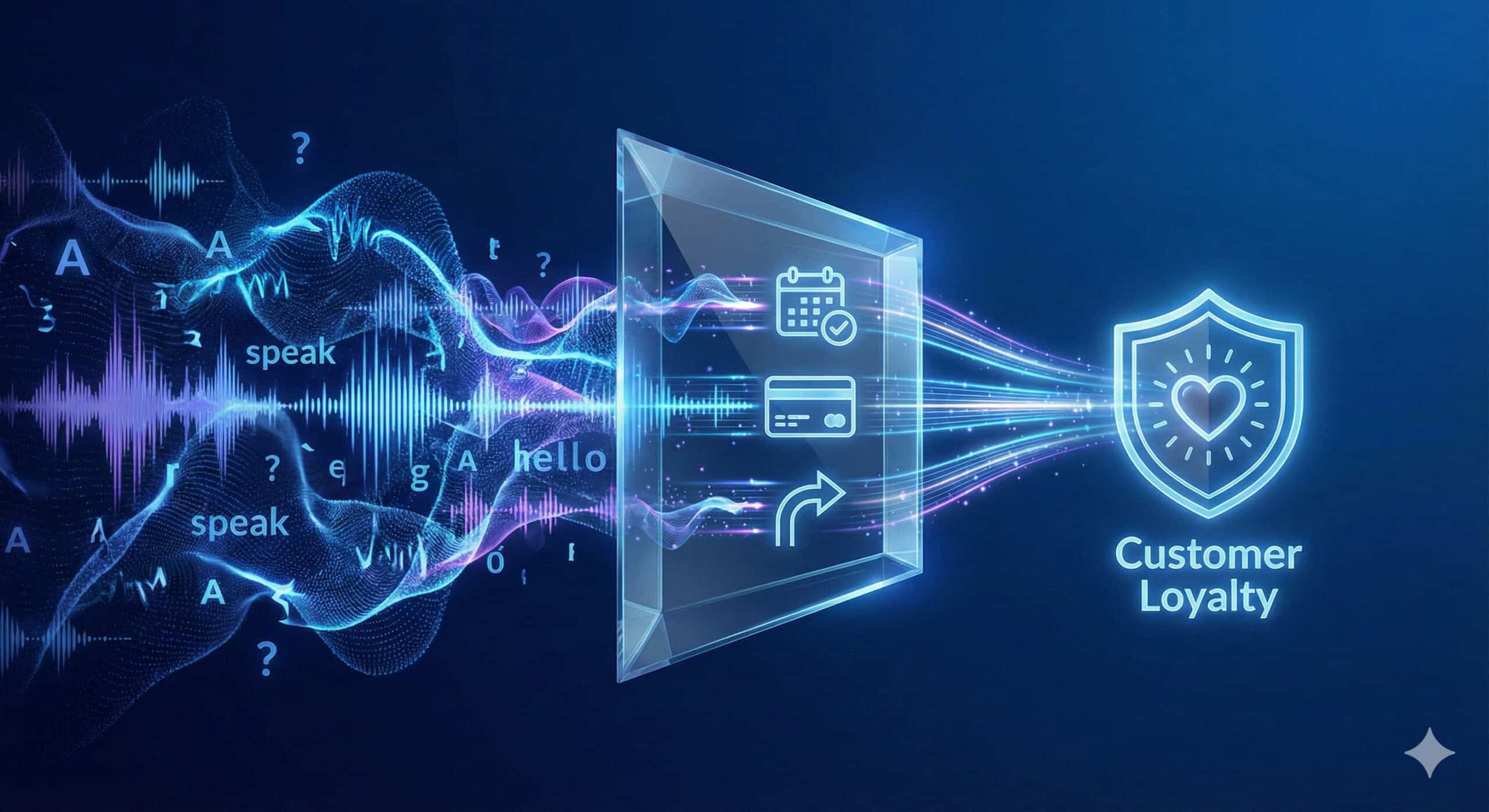
The Impact of IVR with NLP on Customer Loyalty and Retention
Interactive Voice Response (IVR) systems have long played a role in shaping customer experience, but traditional keypad-driven menus often created more frustration than value. Today, IVR combined with Natural Language Processing (NLP) has transformed how businesses handle customer queries by recognising intent, understanding natural speech and responding with more accuracy. These advances directly influence customer loyalty and retention because they reduce effort, improve speed and create smoother interactions. For businesses using IVR with NLP, the benefits extend across every stage of the customer journey.
How IVR with NLP Enhances Customer Understanding
Traditional IVR often forces callers into rigid menu structures, making it difficult to explain complex queries. NLP changes this by interpreting natural speech, recognising context and analysing the intent behind what customers say. This removes one of the biggest barriers to customer satisfaction: having to navigate long lists of options or repeat information multiple times.
NLP also performs well with varied speech patterns, accents and phrasings, which is essential in Australia’s diverse customer base. When callers feel understood from the start, trust increases and frustration declines, laying a strong foundation for long-term loyalty.
Reducing Customer Effort Through Smarter Self-Service
Customer loyalty is strongly tied to how easy it is to get things done. NLP-enabled IVR significantly reduces customer effort by understanding full spoken requests and routing them immediately to the right outcome. Customers can complete many tasks themselves without waiting for an agent, including payment updates, delivery checks, appointment changes and account enquiries.
Self-service becomes a convenience rather than an obstacle when the system understands what callers want without forcing them to memorise menu paths. This ease of use reduces abandonment, strengthens satisfaction and encourages repeat engagement.
Personalised Call Experiences Driven by Real-Time Context
One of the most powerful advantages of IVR with NLP is its ability to personalise interactions. When integrated with CRM or account data, IVR systems can recognise returning callers, recall their previous interactions and adapt call flows accordingly. This level of recognition helps customers feel valued rather than processed through a generic system.
Personalisation is a major factor in retention. Customers are more likely to stay with businesses that address them intelligently, remember their history and anticipate their needs. IVR with NLP delivers this without requiring additional work from advisors.
Intelligent Routing to the Right Agent the First Time
Getting customers to the right person quickly is central to building loyalty. NLP-driven IVR accurately identifies what callers need and routes them directly to agents with the relevant skills. This reduces the number of transfers and avoids situations where customers must explain their issue repeatedly.
Accurate routing also improves First Contact Resolution (FCR), which is one of the strongest predictors of long-term customer loyalty. When issues are resolved quickly, trust grows and customers feel confident continuing to work with the business.
Reducing Queue Times and Managing High-Volume Periods
When call volumes rise, the difference between a smooth and chaotic customer experience often comes down to how effectively the business manages its queues. NLP-enabled IVR triages calls rapidly, separating simple tasks from complex ones and directing callers accordingly.
By diverting straightforward enquiries to automated handling, queues become shorter and more manageable. Callers are less likely to abandon calls or become frustrated by long wait times. Reduced congestion benefits customers and staff alike, making the overall service more reliable.
Helping Businesses Capture Customer Insights for Retention Strategy
IVR with NLP provides valuable insight into customer behaviour that can support retention efforts. NLP analysis identifies patterns, common themes, recurring issues and shifts in customer sentiment. These findings can be used to improve processes, update scripts, refine products or offer more targeted support.
Insights gathered through IVR touchpoints help businesses create more accurate customer personas and predict emerging service challenges before they escalate. A better understanding of customer needs leads to more effective loyalty strategies.
Improving Accessibility for All Customer Groups
A major advantage of NLP-driven IVR is increased accessibility. Customers who struggle with traditional keypad systems, including those with mobility limitations, vision impairments, low digital literacy or language barriers, benefit from speech-driven interactions. IVR with NLP also improves support for different accents and multilingual needs.
By making support accessible to all callers, businesses demonstrate inclusiveness and care, which significantly improves loyalty among diverse customer groups.
Reducing Repetition and Frustration Across Touchpoints
A common source of dissatisfaction is being asked to repeat information when transferred between teams. NLP-enabled IVR reduces this by capturing intent, summarising the caller’s request and passing it to the receiving agent instantly. Context-rich transitions make conversations smoother and more respectful of the customer’s time.
When customers avoid unnecessary repetition, they associate the brand with efficiency and competence, two key drivers of retention.
Strengthening Brand Perception Through Modern, Reliable Interactions
Outdated IVR systems with long menus and unclear options often damage brand perception. NLP-enabled IVR represents a modern, responsive and customer-focused approach that aligns with the expectations of today’s consumers.
A positive interaction with IVR reflects positively on the business as a whole. Customers view the organisation as innovative, capable and invested in good service, which increases their likelihood of staying loyal over the long term.
Use Cases and Industry Examples
NLP-powered IVR benefits a wide range of industries. Examples include:
- Retail businesses using AI-driven routing for delivery checks and returns
- Healthcare providers are managing appointment changes and reminders more efficiently
- Financial services enabling secure authentication and streamlined account enquiries
- Utilities that handle large spikes in call volumes during outages or billing cycles
Across all sectors, the result is a smoother experience that strengthens customer trust.
Practical Steps to Implement IVR with NLP Effectively
Rolling out IVR with NLP requires a structured approach. Businesses need to define clear goals, understand customer expectations and ensure that technology supports, rather than replaces, good service. Planning and consultation with operational teams are essential so that the IVR journey aligns with real customer needs and common enquiry types.
Key steps include:
- Mapping all common customer intents before building the system
- Avoiding complex call flows that confuse callers
- Testing voice recognition accuracy using Australian speech patterns
- Ensuring CRM integration so customer data informs personalisation
Regular monitoring, training and optimisation ensure the system continues to meet customer needs as they evolve.
Challenges and How to Avoid Them
While the benefits are significant, there are risks if IVR with NLP is implemented poorly. Inaccurate speech recognition can lead to customer frustration, especially if callers feel misunderstood. Overusing automation without adequate human escalation can harm the experience rather than improve it.
Successful deployment requires balanced design: automation for simple tasks, intelligent routing for complex ones and clear pathways to speak with a person when required. Ongoing feedback from customers and frontline agents is vital to refining prompts, scripts and routing rules.
How Outsourced Providers Support NLP-Driven IVR
Many businesses, especially SMEs, lack the resources to build and manage sophisticated IVR systems internally. Outsourced providers bring expertise in designing IVR flows, training NLP models and tuning recognition accuracy over time. They also offer 24/7 support, ensuring that customers always receive timely assistance.
Outsourcing allows businesses to benefit from NLP-driven IVR without needing internal technical specialists, helping them improve loyalty with minimal disruption. Partnering with an experienced contact centre provider also makes it easier to integrate IVR with other channels and maintain a consistent standard of service.
Conclusion
IVR with NLP has transformed the customer experience by making interactions faster, clearer and more personalised. Its ability to understand natural speech, reduce effort and route enquiries accurately contributes directly to customer loyalty and long-term retention. When designed and managed effectively, NLP-enabled IVR becomes a powerful tool for businesses looking to strengthen their customer relationships and improve overall service quality.
FAQs
Q1: How does IVR with NLP differ from traditional IVR?
A1: Traditional IVR relies on keypad menus, while NLP-enabled IVR understands natural speech, recognises intent and responds more accurately, making interactions faster and less frustrating.
Q2: Does NLP work well with Australian accents?
A2: Yes. Modern NLP systems are trained on diverse speech patterns and perform well with regional Australian accents and variations in phrasing.
Q3: Can IVR with NLP reduce wait times?
A3: It can. By handling simple enquiries automatically and routing others more efficiently, IVR with NLP reduces congestion and shortens queues.
Q4: Is customer data safe when using NLP?
A4: When implemented correctly, NLP systems follow strict security and privacy protocols, ensuring that caller information is protected at every stage.
Q5: Does IVR with NLP require major system changes?
A5: Not always. Many businesses integrate NLP-driven IVR with their existing platforms, making it possible to modernise service without replacing core systems.



